Cycle racing started as early as 1868 when a race took place in a park
on the outskirts of Paris. In the 1870s cycle racing became a popular
spectator sport in the UK. It was held in many towns and cities
including Liverpool, London, Sheffield and Wolverhampton, which became
one of the main cycle manufacturing centres.Cycle
racing events in Wolverhampton began at the Vauxhall Pleasure Grounds,
in Cannock Road and later at the grounds of Molineux House. On Monday
6th June, 1870, 1,000 people came to Vauxhall Pleasure Grounds to watch
William Turner's All-England cycle contest for amateurs who have never
won any prize. In reality most of the competitors were from the local
area. The early races in Wolverhampton were organised by cycle
manufacturers Forder and Traves.
Due to the success of the events at Vauxhall
Pleasure Grounds, the proprietor of the Molineux Hotel, Mr. O. E.
McGregor began to organise cycle races in the hotel’s spacious grounds.
He began promoting the races in 1870 and turned Molineux grounds into
one of the most important cycle racing venues in the country.
Large numbers of
spectators came from all over the country to watch the
events at Molineux, which attracted the best riders of the
day. As many as 20,000 people flocked to watch some of the races that
attracted such riders as Henry Pascoed from Paris; James
Moore, who won many of the first races, Jack Keene, one of
the fastest riders of the day, Mr. Shelton, a local rider,
H. O. Duncan, who was the 50 mile world champion in 1885 and
R. Howell who was world cycling champion.
|
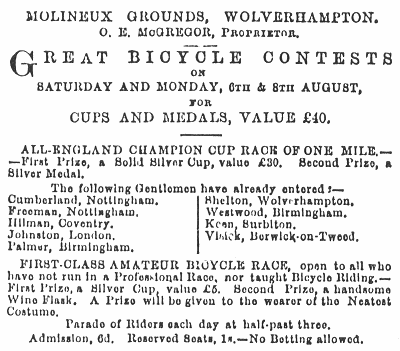
Wolverhampton Chronicle, 3rd August, 1870. |
Most of Mr. McGregor's races featured high wheelers, which
were the fastest machines at the time, but tricycle races were
also held. Races were held weekly and reports appeared in the
Wolverhampton Chronicle, which give a good idea of what went on. In 1872
a meeting took place on the 20th and 21st of May. The highlight of
the day was the mile championship in which Wolverhampton rider Shelton
beat Surbiton's Jack Keen by ten yards, with a time of 3 minutes 13
seconds.
In August Keen beat Shelton in a record time of 3 minutes 9.5
seconds and by September he had reduced his time to 3 minutes 6 seconds. |
| In August 1873 Shelton got his revenge when Keen
took a tumble and he had an easy win. On the same day he also won the
four mile race in a time of 13 minutes 34.75 seconds.
Valuable prizes
were offered to successful competitors. In February 1874, F. Cooper beat
James Moore by two yards in the one mile race and won £100, a large sum
of money at the time. His time was 3 minutes 9 seconds. |
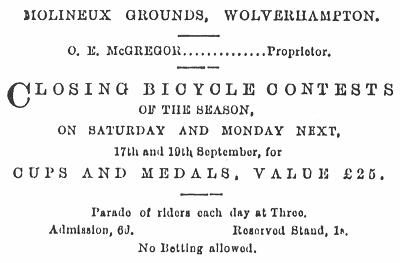
Wolverhampton Chronicle, 14th September, 1870. |
| In August 1870, the Chronicle listed some of
the valuable prizes including a £30 cup for the All-Comers
Champion Cup Race of one mile and a £5 silver cup and a handsome
wine flask: for the First Class Amateur Race. There were also
prizes for the wearer of the neatest costume, which was often
divided between Shelton and Turner. Shelton would be
attired in a rich mazarine blue jacket, with white sash and
Turner in an emerald green jacket, and white breeches. Some of
the events were held over two days to attract more spectators.
In August 1870 a race between a number of international
riders including J. T. Johnson, John Keen, James Moore, and E.
Shelton attracted 2,000 spectators on the Saturday and same
number on the following Monday. The event was won by Parisian,
James Moore. |
|
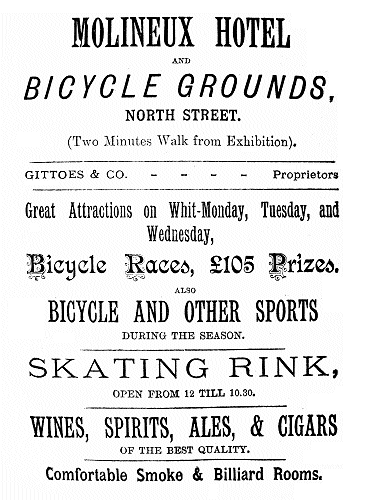
An advert from the early 1880s. |
During the
winter of 1874 a 50 mile race was arranged between Jack Keen and David
Stanton who was considered to be the greatest cyclist in the world.
Unfortunately Stanton took a tumble after the 31st mile leaving Keen to
win in a record time of 3 hours 9 minutes 19 seconds. In 1886 Molineux was the venue for the
International Bicycle World Championships, such was its stature. High
wheelers eventually gave way to safety bicycles and the
popularity of the races greatly encouraged some of the early
manufacturers.
Many of the competitors opened their own workshops to
make bicycles. One of them, Daniel Rudge, an excellent mechanic, made
many improvements to his cycles and produced the best racing machines of
the day. He won the first race that was held at Molineux and later
received the gold medal at the Stanley Cycle Club's first exhibition in
London. Another local rider, Alfred Forder, began to produce machines on
a large scale and Edward Lisle founded the Star Cycle Company.
|
|
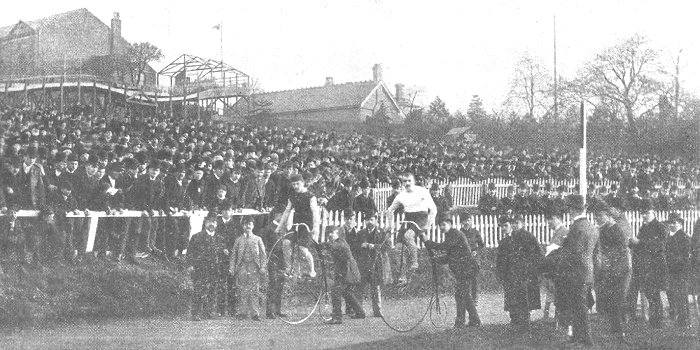
A cycle race at Molineux. From a
Wolverhampton handbook. |
|

A ticket for one of the cycling events
at Molineux.
Courtesy of Briony Pulford. |
|

A bicycle race at Molineux. Courtesy of Jim
Boulton. |
|
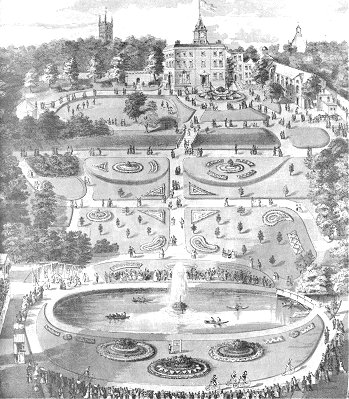
A black and white copy of a poster
showing a cycle race taking place at Molineux. Courtesy of
Jim Boulton. |
In 1886 Mr. McGregor sold the Hotel and grounds to
Mr. Edwin Steer, the first of many new owners. In 1889 the gardens were
removed and the Molineux football ground was built, but bicycle races
continued, albeit infrequently, for many years.
Links were formed between the cycle manufacturers and cycle
racing. April 1869 saw the formation of the Wolverhampton &
Staffordshire Velocipede Company and the Wolverhampton &
Staffordshire Velocipede Club. The Wolverhampton & Staffordshire
Velocipede Company was founded to promote cycling in the local
area and enabled members to buy cycles by paying £10 monthly
instalments. The company rented practice grounds, taught members
to ride, and lent them machines. Alderman Thomas Bantock
who was chairman of both the company and the club, stated at a
meeting at the Agricultural Hall that he recommended the use of
the velocipede as a means of pleasant relaxation and healthful
enjoyment. Also at the meeting, Forder and Traves demonstrated
the ease of use of the cycle and its rapidity. |
| The club was formed to enable members to buy cycles and ride
them in the club's practice room. Proficient members were
allowed to participate in cycle excursions into the country and
to enter races between other clubs and other riders. |
|
Wolverhampton
Chronicle, Wednesday, 21st April, 1869:
Wolverhampton &
Staffordshire Velocipede Company
Capital £200,
in 200 £1 Shares
Chairman - Thos. Bantock Esq.
Secretary - Mr. Hen. Allen
Sole Agents for Forder and
Traves celebrated Bicycle. For further information,
apply to the Secretary, at the Offices of the
Company, 63, Queen Street, Wolverhampton.
Wolverhampton &
Staffordshire Velocipede Club
Chairman - Thos.
Bantock Esq.
Secretary - Mr. Hen. Allen
Subscription £1 1s. per annum.
Shareholders in the Company
holding two or more shares will, on becoming
Subscribers to the Club, have the benefit of a
reduction in their Subscription.
For further information, apply to the Secretary, at
the Offices of the Company, 63, Queen Street,
Wolverhampton. |
|
| The address listed above for the company offices, 63 Queen
Street, was E. F. Allen & Sons Limited. The piano and organ
shop. |
|
Wolverhampton
Chronicle, Wednesday, 28th April, 1869:
Wolverhampton &
Staffordshire Velocipede Club
Subscription £1 1s. per annum.
Members of the above Club will
commence their practice on Monday, May 3rd, at 5
o'clock pm, in the Agricultural Hall. Subscribers
are requested to pay their Subscriptions on or
before May 1st to the Secretary, at his residence,
63, Queen-street, to whom all gentlemen wishing to
become Members must apply.
Hen. Allen,
Secretary. |
|
|
Wolverhampton
Chronicle, Wednesday, 21st July, 1869:
Wolverhampton
Velocipede Races,
Tuesday, 27th July, 1869. The
Wolverhampton Bicycle Derby, Distance Two Miles.
1st Prize a
splendid tankard
2nd Prize a handsome cup
Open to all comers being
natives of Great Britain.
The Carlton Cup,
Distance Two Miles.
1st Prize a
splendid tankard
2nd Prize a handsome cup
Open to Members of the
Wolverhampton Velocipede Company,
The Oaks,
Distance 200 yards. Open to all comers.
Prizes – two
cups. The last man to win. A stop or fall to
disqualify.
Entrance for each race 2s. 6d.
Entries must be made on or before Saturday, July
24th, or by post on Monday morning, July 26th. Forms
of entrance, and every information, may be obtained
of Messrs. Forder and Traves, Bilston Street, where
the cups may be seen, or of the Secretary of the
Club, 18 Queen-street, Wolverhampton. |
|
|
The following
is an account of one of the very early
Wolverhampton race meetings. It comes from the
late Jim Boulton's collection, but unfortunately
the date and the newspaper are unknown.
Molineux Grounds,
Wolverhampton - Champion Bicycle Contests
The
closing bicycle contest for the present season,
in connection with the above delightfully
situated grounds took place there on Saturday
and Monday last. Three special prizes were
offered. The first prize being a handsome silver
cup of the value of £15, and second and third
prizes of £5 and £3; in addition to which there
were also money prizes of £1 and 10shillings for
the neatest costumes.
The
entries included some of the most noted bicycle
champions in the kingdom – Turner of Paris and
Johnson of London, with several local
celebrities of the town and district;
consequently the events drew together each day a
numerous attendance of patrons and others
interested in the sports.
The only
event on the card was an All Comers’ Mile Race,
for which there were ten entries, but one
competitor – Cumberland of Nottingham did not
put in an appearance, and it was therefore
decided on Saturday, in order to ensure a field
of runners for the second day, that the losers
in the opening heats doing the best time should
be allowed the privilege of again contending. On
Saturday the first prize of £1 for the best
costume was awarded to E. Shelton of
Wolverhampton who was attired in a rich mazarine
blue jacket, with white sash; whilst the second
prize of 10 shillings was awarded to Turner of
Paris, his costume being an emerald green jacket
and white breeches. The competitors were paired
in five heats, and one, Rogers, walked over, the
distance being nine times round the circle and
thirty yards. Some excellent running took place
and the five heats were won by Forder, Johnson,
Keen, Turner and Shelton.
On
Monday the winners of the heats from the
previous Saturday again assembled to run off the
concluding heats for the prizes, and all the men
being first class, some excellent sport was
shown. Heat 1: Forder first, Rogers second. At
the first start Rogers took the lead, and soon
increased the distance to ten yards. On going
round for the fifth time however, Forder quickly
went to the front and after a gallant struggle,
during which they passed and re-passed each
other twice, Forder ran in an easy winner by 15
yards in 4 minutes 32 seconds.
Heat 3:
Turner 1st; Shelton 2nd.
In this heat Turner took the lead from the
beginning and kept it, gradually increasing the
distance each round, until his opponent had no
chance, and the clever little Frenchman won the
race by nearly thirty yards. This was one of the
quickest races that has been run in this Midland
district, the winner’s time being only 4 minutes
5 seconds, and Shelton being only 5 seconds
later.
The
three winners then drew lots for the final
heats, and the result was as follows: Heat 1:
J. T. Johnson, London 1st, A. Forder,
Wolverhampton 2nd. Forder winning the
toss took the inside, and started off at a
terrific pace, Johnson three yards behind. The
pace increased up to the third lap, when Forder
missed his treadle, and soon after that Johnson
passed him, and kept the lead, winning by about
twenty yards. Time 4 minutes 2 seconds.
Heat 2:
Turner walked over. The final heat was between
Turner and Johnson. A good start was affected,
Johnson being on the inside and leading by four
yards until the end of the second lap, when
Turner made a spurt and contested from the
inside, but Johnson still held it, and then
began the finest race that has been seen in
Wolverhampton. Neck and neck they went on at a
killing pace till the end of the 7th
lap when Turner managed to get the inside, and
after a spirited finish won by about a yard.
Johnson, considering the severe struggle before
with Forder, ran his machine splendidly. Time 4
minutes. There was an immense amount of
excitement, and each man was loudly cheered,
this being the fastest race ever run in
Wolverhampton. We understand that the shortest
time in which a mile has been run by the bicycle
is 3 minutes 30 seconds. The prizes were then
awarded as follows: Turner 1st, the cup prize;
Johnson 2nd; Forder 3rd.
Subsequently a mile race has been run without
using bicycle handles, for a silver medal, which
was won by Shelton of Wolverhampton, defeating
Turner and Johnson. As we have above stated
there was a numerous attendance each day; Mr.
Trotman ably officiated as clerk of the course
and starter, and the most commendable good order
was kept throughout each day’s proceedings. |
|
Cycle Clubs
and Road Racing
During the 1870s cycling became extremely popular,
no doubt helped by racing events such as the ones held at Molineux.
Clubs sprang up across the country and one on the first was the Aston
Cycle Club of Birmingham, founded in 1869. The following year saw the
formation of the Edinburgh Amateur Bicycle Club and the prestigious
Pickwick Bicycling Club with branches in many towns.
In 1878 two important and influential clubs were
founded. The first, the Bicycle Touring Club was formed at Harrogate and
soon had over 500 members. In 1883 it became the Cyclists Touring Club.
The second, the Bicycle Union became the National Cyclists Union or
N.C.U. in 1884. By 1880 there were around 250 clubs and by 1890 thirteen
magazines dedicated to cycling were on sale.
Like most towns, Wolverhampton had many cycling
clubs including the Sun Bicycle Club formed in 1874
and based at the Sun Inn in Commercial Road. In 1884 the Wesleyan Cycle
Club was formed and meetings were held at the Darlington Street Wesleyan
Schools. They had around 40 members with an annual subscription of
2s.6d. Other clubs such as the Mount Zion Cycling Club and St. Matthew's
Cycling Club were based at church schools, whilst most of the others met
at local pubs.
The Wulfruna Cycling Club met at the New Inn,
Horseley Fields and The Grosvenor met at the Popler Hotel, Wednesfield
Road. Its annual subscription was 4 shillings for ordinary members and
10s.6d for honorary members. A lot of money at the time. The Queen
Victoria in Ablow Street, near to Sunbeamland was home to the Sunbeam
Cycle and Athletic Club, and the famous Wolverhampton Wheelers, founded
in 1880, met at the Talbot Hotel.
|

An early bicycle club. Courtesy of Jim
Boulton.
|
Many cycling clubs soon turned their attention to road
racing and the wheelers were no exception. After an initial
decline the club reformed in 1924 as a racing club with many
prominent and well-known members such as Percy Stallard, Bob
Thom and Benny Whitmore. The newly formed club held meetings
in Percy Stallard's shop at 30 Broad Street. Other clubs
also met at cycle shops, including the City Cycling Club
based at Poyners on Dudley Road and Central Roads that met
at Hayward's Cycles on Snow Hill.
Wolverhampton clubs including The Clarion joined
forces with the Walsall Cycle Racing Club and Walsall Roads to form the
South Staffs Time Trial Association and organised many time trials,
often run on Watling Street between Gailey and Newport. In 1938 George
Courier of Wolverhampton's City Cycling Club held the 60 mile record
from Wolverhampton to Shrewsbury and back, in a time of 2 hours 46
minutes 2 seconds. Local dealers such as Percy Stallard and Jack Green
of Bilston Street built many specialised racing machines for club riders
and they were "a must" for many of the riders.
The Wolverhampton Racing Cycling Club was founded
in May 1938 and affiliated to the N.C.U. and the Road Time Trials
Council (R.T.T.C.) with a membership of around 60 members including some
of the best road men of the day. By 1984 Wolverhampton Wheelers had
around 200 members including Hugh Porter M.B.E. and the successful rider
Bob Thom. The club had excellent club rooms and facilities at Aldersley
Stadium.
Local manufacturers also had racing teams which
helped to increase sales of their products. Viking Cycles of 34 Princess
Street and Princess Alley had a very successful team as did Wearwell of
Colliery Road and Hateley's cycle shop on Stafford Road.
Some Local
Riders and Their Successes |
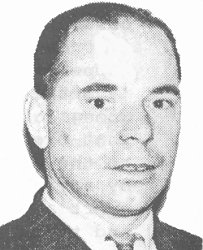
Percy Stallard. Photo courtesy of Jim
Boulton. |
One of the most famous local racing cyclists, Percy
Thornley Stallard was born at his father's bicycle shop
premises at 30 Broad Street in about 1910. He eventually
took the shop over from his father and ran it until his
retirement in the1990s. Percy began competitive cycling at
the age of 17 and rapidly made a name for himself. He was a
member of the Wolverhampton 'Wheelers' Cycling Club and
selected for the World Road Racing Championship at
Monthlery, France in 1933. He finished in 12th position and
was selected for the following year's event at Leipzig,
Germany, finishing in 6th place. In 1935 the championship
was held at Namur in Belgium and Percy finished in 12th
place in front of a vast crowd of spectators. Percy
trained his own team of Wolverhampton cyclists, and in 1938,
one of the team, Ray Jones, won the silver medal in the
Empire Games. |
The Wolverhampton club entered many races and Percy
became well known for his racing successes. In 1939 he won a
62 mile race in a time of 3 hours, 2minutes, 59 seconds and
came in first in the last cycle race to be held at
Brooklands. He also represented England in the World Road
Racing Championship in 1937 and became team captain in 1939.
Unfortunately the event for that year was cancelled due to
the beginning of the war.
Percy brought cycle road racing to Britain. In the 1940s it
was illegal to race on public roads and Percy organised a
massed-start race from Llangollen to Wolverhampton, on June
7th, 1942. The event went ahead in spite of vicious
opposition from the national governing body, the National
Cyclists Union (N.C.U.). There were 28 keen competitors and
27 of them would complete the course. A fast pace was set
from the start and at Shrewsbury A. Dobson of the Royal Navy
led the field in a time of 1 hour 18 minutes, a full 17
minutes ahead of the expected time. In 2nd place was J.
Beeston of Birmingham followed by R. Jones of Wolverhampton. |
| With 7 miles to go at Summerhouse Hill, Albert Price
and Cecil Anslow, both of Wolverhampton, led the field
and Corporal J. Jones of the Royal Air Force followed
close behind. An outstanding effort considering that he
had been delayed with a broken chain. 2,000 spectators
awaited the outcome at West Park and they saw an amazing
finish with Albert Price winning by just two lengths
ahead of Cecil Anslow. |
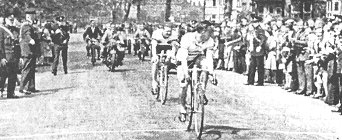
| Albert Price
finishing the Llangollen to Wolverhampton
race at West Park. Courtesy of Jim Boulton. |
|
|
J. Jones came in third and J. Kremers
finished in fourth place. The race had been a great success
and the Express & Star Comforts Fund benefited by the sum of
£105. Percy Stallard should have felt proud of his
achievement but all of those involved were suspended by the
N.C.U. and the R.T.T.C.
The enthusiasts were undaunted by the expulsions and formed
the Midland League of Racing Cyclists. Other similar
organisations were formed and in November 1942 they came
together to form the British League of Racing Cyclists
(B.L.R.C.) with Percy Stallard as event organiser. This led
to a bitter 17 year long conflict with the N.C.U., during
which all of the cycle clubs in the country were forced to
declare allegiance to one body or the other. Percy was soon
expelled from the league for criticising its standard of
race organisation, but soon returned. In 1951, he organised
the first London to Holyhead race, which was the longest
race in Europe at the time. His influence led to the setting
up of the Milk Race and the Tour of Britain. In 1955 the
first British team took part in the Tour de France.
In 1959 the B.L.R.C. and the N.C.U. merged and Percy, who
was disillusioned, quit the sport. He even sacked Ralph
Jones, who was his assistant in the cycle shop, because
Ralph was the B.L.R.C. delegate at an international meeting
in Spain. Percy's campaigning eventually paid off, as
government legislation was introduced on March 1st 1960,
which made road racing legal and paved the way for such
events as the Tour of Britain. Percy returned to cycle race
organisation, running events for veterans. In 1985 he
organised the first age-related race in the country which
took place at Albrighton on 28th April.
|
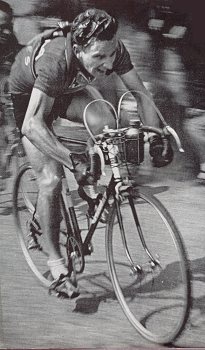
From the cover of the 1948 Viking
Cycles catalogue, showing Bob Thom, one of the best racing
cyclists in Britain at the time. Courtesy of Jim Boulton.
|
Another well known and successful rider was Bob Thom who
began to compete in 1935. He soon became a member of the
Wolverhampton Wheelers with fellow team mates Percy Stallard
and Ray Jones. Bob finished in 6th place in the first N.C.U.
mass start race at Donington Park and won the first Midland
Centre Massed Start Championship with the wheelers gaining
the team prize. During World War 2 he joined the RAF and
on his return after the war his competitive career with the
wheelers continued. He joined the B.L.R.C. and became
Independent Road Champion and a member of the winning team
that competed at Tilburg. His first league win was at the
100km circuit at Dudley and many more successes followed. He
was 15th in the National Road Championships in Scotland and
won the Grand Prix at Weston Super Mare. He also won the
first Severn Valley Grand Prix and repeated his success in
1948. Bob went on to win the notorious Tour of the Peaks and
finished in 12th place in the 1947 Brighton to Glasgow race.
Bob's racing career really took off when Reg Davies of Viking Cycles
decided to form a racing team and Bob became a member along with Ben
Whitmore and Bill Allen. The team was very successful and did a lot to
promote the company's products. |
|
In the 1950s he decided to retire from active racing and give back to
the sport some of the pleasure he had derived from it. As Viking team
manager and England team manager he was the architect of many famous
British victories. He continued to support local clubs and give any help
he could to young riders. His son Bob junior, who was a mechanic in his
father's team later became England team manager in his own right.
Wolverhampton's best known racing cyclist must be Hugh Porter who was
four times World Pursuit Champion. He is a great celebrity in Europe,
but even though he cycled on British roads he is virtually unknown over
here.
References:
“Wolverhampton Cycles and
Cycling” by Jim Boulton. Published in 1988 by Brian Publications.
 |
Return to the
previous page |
|
|